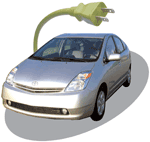11 Years On; The Politics of Plugging-in - Washingon's Choice Of Future's Fuel - Originally Published October 2010
 |
SEE ALSO: Electric Vehicles - Solution or Diversion?
SEE ALSO: Our "Opium War" With Gasoline
By Steve Purdy
TheAutoChannel.com
Detroit Bureau
DETROIT, MI - October 22, 2010: I recently had an enlightening chat with veteran Congressman, John Dingle, a democrat from Ann Arbor, who has been a staunch supporter of the auto industry for his entire long career. Of course, representing a district in Southeast Michigan, I guess that’s a no-brainer. Just prior to making a speech to the assembled industry folks at a conference called “The Business of Plugging In” a few of us had the privilege of sitting down with the Congressman to ask a few questions.
Much of our questioning had to do with the proper role of government in the development of the electric car business, or any specific industry for that matter, and whether our government is engaged in the most positive and productive way. The answers were mixed.
Congressman Dingle believes “you can invest your way out of a financial problem,” like the one we’re digging out of now. He insists the money we’ve poured into the auto industry, both in rescue funds and stimulus dollars, has been money well spent. We talked about the generosity with which other governments have supported their domestic industries as the reason they are ahead of us in the commercialization of many automotive innovations, particularly the electrification of cars and trucks. Some of our major competitors, in fact, are using our technology to beat us up in the market.
One thing to which everyone at the conference seemed to agree is that we need a national energy policy with enough specificity to guide innovation. That may seem oxymoronic since maximum innovation would seem to require wide-open parameters, but it is important to have some framework that would facilitate investments because there would be more predictable markets. That is, investment capital would become more accessible with more structure.
Congressman Dingle insisted with his tongue firmly planted in his cheek that we have had a national energy policy all along. “Our energy policy,” he quipped, “historically has been to worry like Hell from time to time, then coast.” He expressed no optimism that we would be able to establish a comprehensive national energy policy in the foreseeable future.
His message is that government certainly does have a role to play, in fact a crucial role: that of partnering with, and supporting, domestic business. That may seem anathema to our form of capitalism but we must do that to compete in the new world economy. We are now playing catch up to China, Korea and even India in battery production because our competitors in those countries have partnered with their respective governments.
The electrification of our automobiles may or may not be the best solution to the energy and transportation problems we face but that certainly is the way the world is leaning now. Most of the manufacturers agree that in the long term we’ll be driving fuel cell electrics, but that’s a long way into the future. In the meantime a lot of effort is going into other iterations of electric propulsion, from mild hybrids to pure plug-ins. No one though was predicting those vehicles would be anything more than niche vehicles in the next 15 years.
We asked our congressman whether he thought the government was reasonably balanced in the distribution of R&D money, or is the government choosing winners and loosers. He thought we are considerably behind in diesel but thought we are doing fine in ethanol and other biofuels. Many would beg to differ, I must report – particularly our publishers here at TheAutoChannel.com who advocate more emphasis on ethanol, an eminently renewable resource.
At Mr. Dingle’s side through this discussion sat Dr. Ann Marie Sastry who is both an academic and an entrepreneur. In addition to being a distinguished engineering professor at the University of Michigan she oversees a start-up company developing the next generation of automotive batteries. Dr. Sastry agreed that it is incumbent on government to support domestic business if we want to compete with the rest of the world where that is common practice. While the Chevy Volt represents a viable new vehicle formula, though a bit pricey, there must be much more to come. She and the representative from the power company seated next to her were in complete agreement with Congressman Dingle.
More Volt talk came from the GM guy in the parking lot where Doug Parks who is “living the dream” of driving an average of 90 miles/day and filling his tiny gas tank (about $13 worth) about every 10 days. Of course he has charging stations both at work and at his Warren Tech Center office, which is better than most Volt buyers will have. He rode along with Michigan’s lame-duck governor, Jennifer Granholm, generally acknowledged as an enthusiastic and somewhat successful cheerleader for the electric car industry. Governor Granholm enthused about her short drive in the Volt describing it as surprisingly smooth, luxurious and conventional-feeling – nothing odd or disconcerting about driving this electric car, she thought.
Our other notable politician at the conference was Michigan’s senior senator Carl Levin who gave the lunch address on day two. His message and concerns were much the same. Without any expectation of near-term commercial viability the Federal government is pouring great deals of money into the business – but not nearly as much as our overseas competitors.
So, in these couple of days we’ve had the governor, one senator and a congressman all with the same message, that is, government has a big and important roll to play in the electric car business.
Whether we agree or not. Whether it makes sense or not. That’s the landscape today.
© Steve Purdy, Shunpiker Productions, All Rights Reserved


